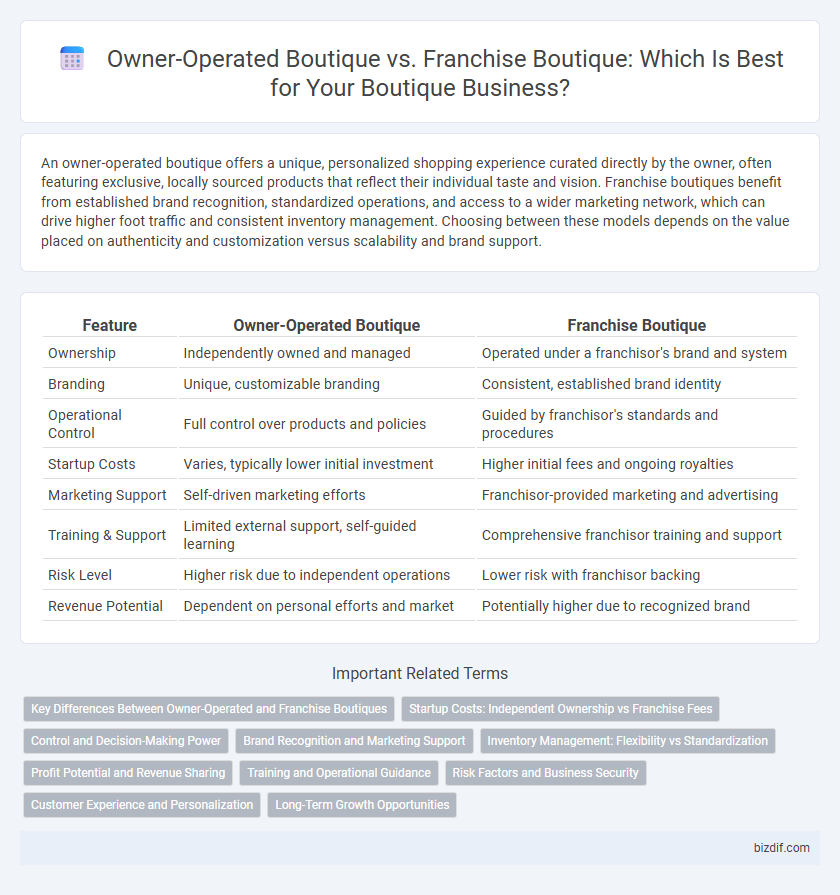An owner-operated boutique offers a unique, personalized shopping experience curated directly by the owner, often featuring exclusive, locally sourced products that reflect their individual taste and vision. Franchise boutiques benefit from established brand recognition, standardized operations, and access to a wider marketing network, which can drive higher foot traffic and consistent inventory management. Choosing between these models depends on the value placed on authenticity and customization versus scalability and brand support.
Table of Comparison
| Feature | Owner-Operated Boutique | Franchise Boutique |
|---|---|---|
| Ownership | Independently owned and managed | Operated under a franchisor's brand and system |
| Branding | Unique, customizable branding | Consistent, established brand identity |
| Operational Control | Full control over products and policies | Guided by franchisor's standards and procedures |
| Startup Costs | Varies, typically lower initial investment | Higher initial fees and ongoing royalties |
| Marketing Support | Self-driven marketing efforts | Franchisor-provided marketing and advertising |
| Training & Support | Limited external support, self-guided learning | Comprehensive franchisor training and support |
| Risk Level | Higher risk due to independent operations | Lower risk with franchisor backing |
| Revenue Potential | Dependent on personal efforts and market | Potentially higher due to recognized brand |
Key Differences Between Owner-Operated and Franchise Boutiques
Owner-operated boutiques offer personalized customer experiences and unique product selections curated by the proprietor, fostering strong community ties and brand individuality. Franchise boutiques benefit from established brand recognition, standardized marketing strategies, and operational support but often lack the flexibility to customize offerings extensively. The key differences lie in control over inventory and branding, with owner-operated shops emphasizing autonomy, while franchises leverage proven business models and collective resources.
Startup Costs: Independent Ownership vs Franchise Fees
Startup costs for owner-operated boutiques generally involve lower initial investments, primarily covering inventory, rent, and interior design. Franchise boutiques require substantial franchise fees and ongoing royalties, significantly increasing upfront and operational expenses. Independent ownership allows more control over budgeting and financial decisions, while franchise fees can limit profitability margins despite offering brand recognition and support.
Control and Decision-Making Power
Owner-operated boutiques maintain full control and decision-making power, allowing for personalized customer experiences and unique brand identity. Franchise boutiques operate under established corporate guidelines, limiting individual autonomy but benefiting from proven business models and marketing support. This difference significantly impacts operational flexibility and strategic direction.
Brand Recognition and Marketing Support
Owner-operated boutiques benefit from personalized brand identity and local customer loyalty, creating a unique shopping experience tailored to community preferences. Franchise boutiques leverage extensive brand recognition and centralized marketing support, offering consistent promotional campaigns and economies of scale in advertising. While owner-operated boutiques rely on grassroots marketing and direct customer engagement, franchise boutiques capitalize on established brand reputations and professional marketing resources.
Inventory Management: Flexibility vs Standardization
Owner-operated boutiques benefit from flexible inventory management, allowing them to tailor stock selection based on local customer preferences and seasonal trends. In contrast, franchise boutiques implement standardized inventory systems that ensure consistency across multiple locations but limit individual customization. This standardization streamlines supply chain processes but often reduces the ability to adapt quickly to changing market demands.
Profit Potential and Revenue Sharing
Owner-operated boutiques typically enjoy higher profit margins due to full control over pricing, inventory, and marketing decisions without franchise fees or royalties. Franchise boutiques benefit from established brand recognition and support systems but must share a significant portion of revenue through ongoing franchise fees, reducing net profit potential. Independent ownership allows for flexible business strategies tailored to local markets, while franchises rely on standardized operations that may limit revenue optimization opportunities.
Training and Operational Guidance
Owner-operated boutiques benefit from personalized training tailored to the owner's vision and direct involvement in daily operations, fostering authentic brand expression. Franchise boutiques receive standardized training programs and operational guidance from the franchisor, ensuring consistency and adherence to established protocols across locations. Customized support in owner-operated models contrasts with the systemized approach in franchises, impacting flexibility and brand uniformity.
Risk Factors and Business Security
Owner-operated boutiques face higher individual financial risk due to sole liability for operational costs and market fluctuations, whereas franchise boutiques benefit from established brand recognition and corporate support, which enhance business security. Franchise owners often have access to training, marketing, and supply chain advantages that mitigate risks related to startup failures and customer acquisition. However, owner-operated boutiques maintain full control over decision-making and profit margins, exposing them to variable risks without the buffer of franchisor assistance.
Customer Experience and Personalization
Owner-operated boutiques offer a highly personalized customer experience, with owners deeply involved in curating unique product selections and building strong relationships with clients. Franchise boutiques often follow standardized procedures that can limit customization but provide consistent service and branding across multiple locations. Customers at owner-operated boutiques benefit from tailored shopping experiences driven by intimate knowledge of their preferences and local trends.
Long-Term Growth Opportunities
Owner-operated boutiques benefit from personalized brand identity and agile decision-making, fostering authentic customer loyalty that drives sustainable long-term growth. Franchise boutiques leverage established brand recognition and proven business models, offering rapid expansion and economies of scale but often facing limitations in local market adaptation. Sustainable growth in owner-operated boutiques stems from deep community connections, while franchise boutiques prioritize consistent operational efficiency across multiple locations.
Owner-Operated Boutique vs Franchise Boutique Infographic

 bizdif.com
bizdif.com